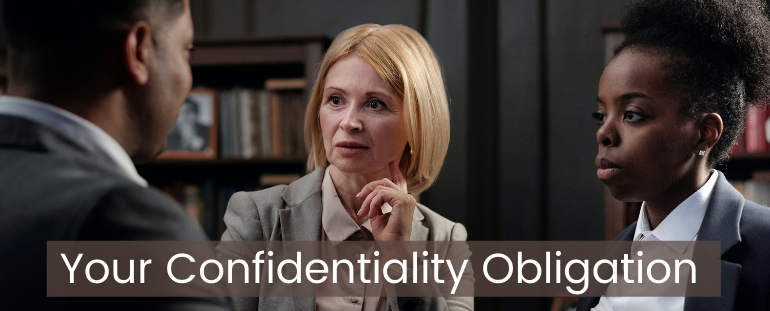
By Edward McIntyre
Macbeth opened the daily Zoom meeting. Sarah’s and Duncan’s boxes lit up on his screen.
“Hello to both of you. All well?”
Sarah answered, “I’m fine, Macbeth. How are you?”
“All’s well, Uncle. With you?”
“Good to hear. Quite fine. I’ve asked Austin, a lawyer in my Inn of Court, to join us.” Some clicks. Another box lit up.
“Welcome Austin. Glad you could be with us.”
“Thanks for having me.”
“Austin raised an interesting issue that our Inn meeting didn’t have time to address. I thought we’d do well to discuss it. Austin, perhaps you’d begin.”
“I’m a former in-house lawyer at a local company. I left after disagreeing with senior management. Frankly, I didn’t like some business practices and couldn’t get executives to change. Wasn’t an ugly parting. But I’m not their favorite guy, either.”
Duncan spoke. “I can imagine.”
Austin picked up. “The company’s now locked in litigation. Executives have filed declarations with stuff I know is just false. Lies. I don’t know how much the company’s lawyers know. Probably not the whole story. Now the lawyers suing the company want my deposition. This may be my chance to set the record straight. I intend to tell the truth. But how far can I go?”
Macbeth started. “Just for clarity, Austin, you’re not a party to the litigation?”
“No, thankfully.”
“Good. Do any of these declarations criticize legal work you’ve performed for the company?”
“No. My role was strictly domestic employment and intellectual property rights. The declarations, by and large, address foreign transactions. Payments to foreign officials. That kind of thing.”
“OK. Very good. Who’d like to go first?”
Sarah took the lead. “As in-house lawyer, the company was your client. So, among other duties, you owe it a duty of confidentiality. California, as we know, has the strictest confidentiality obligation of any jurisdiction.”
“What’s that mean when I’m deposed?”
“Likely means you won’t say very much.”
“How come? I want to tell the truth.”
“Of course. Where you can answer, you have to. But confidentiality sweeps much broader than the attorney-client privilege. The latter — just a testimonial privilege. With several exceptions. Limited to lawyer-client communication related to seeking or giving legal advice.”
“Precisely. But what I know has nothing to do with legal advice I gave. Or advice the company asked for. It has to do with the conduct of these executives —”
Macbeth interrupted, “A quick question, if I may. These executives are sufficiently high in the organizationthat their ‘conduct’ might harm or at least embarrassthe company?”
“Absolutely.”
“Thought so. Sarah, pardon the interruption. Please continue.”
“OK. The attorney-client privilege deals with communication. By contrast, our confidentiality obligation covers all information acquired in relation to the representation. From whatever source. Even if it’s public. So long as the client wants it kept confidential. Or its disclosure would be detrimental or embarrassing to the client.”
“You mean what I observed? Not just what someone told me?”
“Sounds like information to me.”
“What about exceptions? There have gotta be exceptions.”
“Just two. If the client gives informed consent to the disclosure.”
“Not likely here.”
“Absent that, only if a lawyer reasonably believes a client is about to commit a crime. Reasonably resulting in death or serious bodily harm to someone. Then, the lawyer may, but isn’t required, to disclose the information. But only to the extent necessary to prevent the crime. Only after trying to dissuade the client from going forward.”
“How about serious financial harm. I mean, disaster on roller skates.”
“Not in California.”
Duncan spoke. “We call it the ‘murder/mayhem’ exception. Easy to remember.”
“But I’m no longer representing the company. Doesn’t that count?”
Sarah picked up. “Not for your confidentiality obligation. It lasts so long as the lawyer’s alive.”
“So, when they ask at my deposition, what I know —”
Macbeth chuckled. “You invoke your ethical obligations under Rule of Professional Conduct 1.9(c) and Business and Professions Code section 6068, subdivision (e)(1). And silently watch them fume.”
Sarah added, “I can give you a lot of legal authority to support your position.”
“Should I have my own lawyer? At the deposition?”
Macbeth grew serious. “Many lawyers conflate attorney-client privilege and our confidentiality obligation. Few practice in this area. Given confidentiality’s seriousness, you might consider having Sarah there. As your personal lawyer. If there’s a motion down the road, she can make a good record for you.”
“Wow, Macbeth. That’d be great. Sarah, would you consider it?”
“Of course, Austin. Helping lawyers is what we do. Lawyers are our favorite people.”
Editorial Note: COPRAC Formal Opn. 2016-195 has an excellent discussion of, and collects authorities on, the duty of confidentiality and the attorney-client privilege. See calbar.ca.gov under “Ethics Opinions.”
Edward McIntyre (edmcintyre@ethicsguru.law) is a professional responsibility lawyer and co-editor of San Diego Lawyer.